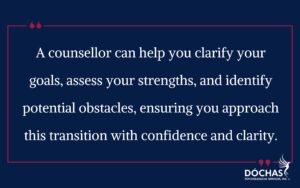Traditionally, career paths were linear: education, a stable job, and retirement after decades in the same field. However, today’s professional landscape is far more fluid. With more years available to work, individuals are discovering new opportunities to explore diverse career paths, often returning to the classroom later in life. No longer limited to fresh high school graduates, many people in their 30s, 40s, 50s, and beyond are pursuing education and training to launch new careers. Even making a career change at 50 can still allow for 15 to 20 years in a new field.
I’m Kim, a counselling practicum student here at Dóchas in Spruce Grove. Before coming to Dóchas, I worked in the financial industry for over 10 years, transitioning into education, where I worked for the next 23 years, teaching elementary, junior high, high school, and even a little bit of university! This is my third career transition—crazy, I know!
I’d love to discuss how you can navigate career transitions with ease and confidence, whether you’re considering a shift, actively making a change, or just exploring new possibilities!

Personal Growth and Fulfillment
People change careers later in life for various reasons. Some may feel they have plateaued in their current positions and seek new challenges. Others might need to retrain due to workplace injuries or changes in health. Some individuals are now in a position to pursue lifelong passions that were once sidelined by family responsibilities or financial pressures.
What you want from your career can also change. Where you once valued stability and security while raising a family, you may now prioritize flexibility and sustainability as part of your retirement plan. Continuing to work into retirement can offer mental, physical, and social benefits, helping guard against the decline in these areas that often accompanies traditional retirement.
The Role of Counselling in Career Transitions
Navigating a career change can be an emotionally charged experience, particularly if you have invested years in a specific field. Counselling can be invaluable during this process, providing a safe space to explore your feelings, fears, and aspirations.

Practical Considerations for a Successful Career Transition
Making a career change at any stage of life involves several practical considerations to ensure a smooth transition. Here are some key factors to think about:
Assessing Transferable Skills
- Identify your strengths: Take stock of the skills you’ve gained in your current or previous roles. Skills like communication, project management, leadership, and problem-solving are valuable across many fields.
- Skill gaps: Identify areas where you may need additional training or education for your new career.
Continuous Learning and Upskilling
- Education: Depending on your new career, you may need to pursue further education or certifications. Online courses, workshops, and part-time schooling can help you build new skills.
- Networking: Connect with individuals in your target field through networking events, industry groups, or social media platforms like LinkedIn. Learning from their experiences can provide valuable insights into your new career.
Financial Considerations
- Budgeting for the transition: A career change may lead to a temporary reduction in income, especially if starting at an entry-level position. Plan your finances to cover this period and adjust your lifestyle accordingly.
- Cost of education or training: Be prepared for potential expenses related to acquiring new skills or credentials.
Market Research and Job Demand
- Industry outlook: Research the job market in your field. Is there demand for professionals with your skills? Are there growth opportunities? Understanding the industry’s stability and prospects is essential for long-term success.
- Salary expectations: Be realistic about compensation in your new career, especially if you’re starting over in a different industry.
Work-Life Balance
- Lifestyle preferences: Consider how the demands of your new career will affect your work-life balance. Will you need to relocate, travel frequently, or work different hours? Ensure the new career aligns with your personal goals.
- Flexibility: If you’re at a later stage in life, prioritize flexibility in your work schedule. Look for opportunities that allow for part-time work, freelancing, or consulting.
Emotional and Mental Preparation
- Adapting to change: Career changes can be emotionally challenging, especially if you’ve spent years in one field. Prepare for the adjustment period and be open to learning, making mistakes, and starting at a different level.
- Building confidence: Self-doubt can arise when entering new territory. Seek support from mentors, career coaches, or professional networks to build confidence in your new path.
Support Systems
- Mentors and coaches: Working with career coaches or mentors in your target field can provide valuable guidance and help you avoid common pitfalls.
- Family and social support: Consider the impact of your career change on your family and loved ones. Having a strong support system can make the transition smoother.
Timing and Transition Planning
- Phased transition: Gradually transitioning, such as working part-time in your new field while maintaining your current job, can ease the financial and emotional burden.
- Readiness: Ensure you are mentally, financially, and practically prepared for a significant change. Rushing into a new career without proper planning will make you stressed and create challenges.
Conclusion
By considering these practical aspects and seeking counselling support, you can plan a career change more effectively and increase your chances of success, no matter what stage of life you’re in. Embracing the idea of breaking age barriers can lead to new opportunities for growth and fulfillment. As you navigate this journey, remember that it’s never too late to reinvent yourself and pursue the career that aligns with your evolving goals and passions. With the right support and preparation, you can create a meaningful and rewarding path ahead.
If you’re struggling with a big career change, please feel free to reach out to Dóchas at 780-446-0300 or info@dochaspsych.com. Book an in-person (Spruce Grove) or virtual (across Alberta) appointment with one of our therapists here.
About Dóchas Psychological
Dóchas Psychological Services is a well-established and trusted therapy clinic located in Spruce Grove, Alberta. At Dóchas we value the idea that everyone deserves a safe space. Through connection and education, our team works hard to build a trustworthy relationship with each of our clients. It is our goal to create a community for our clients to feel like they belong.
Disclaimer
Information provided through Dóchas Psychological Services blogs or vlogs is meant for educational purposes only. They are NOT medical or mental health advice. You can read more about our disclaimer here.









